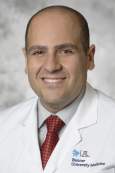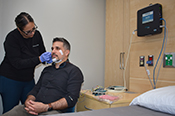
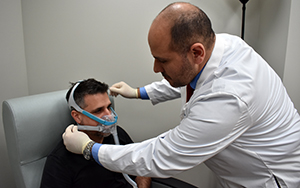
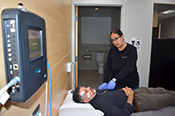
The one-year Sleep Medicine Fellowship Program at the University of Arizona is committed to excellence in sleep medicine training.
Fellows in this program certified by the Accreditation Council for Graduate Medical Education (ACGME) learn to become proficient sleep physicians and learn both clinical sleep medicine that includes excellent patient care, interpretation of sleep studies, and ability to manage an interdisciplinary team that can coordinate and deliver excellent patient-centered care.
The sleep medicine fellow will learn to diagnose and treat patients with a wide range of sleep and circadian rhythm disorders. The program ensures that findings from recent studies, that include health services and patient-centered outcomes research, is translated into practice. It provides training for fellows, who come from different disciplines in all aspects of sleep medicine. Trained sleep medicine faculty are board-certified in sleep medicine with backgrounds in pulmonary, pediatrics, psychiatry, psychology and neurology.
Our sleep medicine faculty at the UA are committed to advancing knowledge in sleep medicine by conducting the highest quality basic, clinical and translational research. Thus, the program consists of a diverse clinical experience that meets ABIM requirements and prepares our fellows for successful subspecialty board examination and certification.
For Sleep Medicine Lecture Series calendar items, see the following link for the Department of Medicine:
For archived lectures, click here.
- For additional information, see this: NRMP/ACGME Recruitment Communication Requirement ►►►
Clinical Experience
The fellow will have clinical rotations at different sleep clinics during the 12-month fellowship period. There are two sites with opportunity to do elective rotations. The first site is at the Banner – University Medical Center Tucson’s Center for Sleep Disorders that includes very busy sleep clinics and a four-bed sleep laboratory that performs laboratory- and home-based sleep studies. The second is at the Southern Arizona Veterans Affairs Health Care System (SAVAHCS), which is a 15-minute drive in south Tucson and also includes a four-bed sleep laboratory.
The fellow will — under the supervision of a faculty member — evaluate and manage patients with sleep disorders, with an emphasis on continuity of care and care coordination that is patient-centered with that underscores excellence in management of patients with sleep disorders. The fellow will interpret polysomnography with the supervising faculty member during the weekdays.
The fellow will maintain a log of all interpretations of polysomnographic studies and Multiple Sleep Latency Test/Maintenance of Wakefulness Tests (MSLTs/MWTs) and other diagnostic tests that includes home sleep studies and positive airway pressure therapy downloads — all of which they will interpret under supervision. Additionally, they will receive one-on-one teaching during their supervised sleep clinics (half-day once a week). At the start of the fellowship, they will receive twice-a-week lectures for the first three months for a total of 24 lectures (“summer intensive lecture series”). Over the rest of the year, they will attend lectures and case presentations during the monthly and highly interdisciplinary sleep conference, which has representation from psychology, pediatric pulmonary, nursing, psychiatry, neurology, ENT surgery, trauma surgery and nutritional sciences. And they will have access to sleep atlases, audio-visual learning tools, and online seminars for self-reading.
Facilities and Resources
 The major Sleep Medicine Fellowship training sites are Banner – University Medical Center Tucson and South clinical facilities (on right), Banner – University Medicine North, Building 2 (at left),
The major Sleep Medicine Fellowship training sites are Banner – University Medical Center Tucson and South clinical facilities (on right), Banner – University Medicine North, Building 2 (at left), 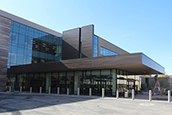 and the Southern Arizona VA Healthcare System (SAVAHCS), with its flagship Tucson VA Medical Center. Details for each of these facilities can be found on our "Where We Teach & Train," "Accolades & Awards" and "Facts & Figures" webpages.
and the Southern Arizona VA Healthcare System (SAVAHCS), with its flagship Tucson VA Medical Center. Details for each of these facilities can be found on our "Where We Teach & Train," "Accolades & Awards" and "Facts & Figures" webpages.
The research facility most associated with our program is the UA Health Sciences Center for Sleep, Circadian & Neuroscience Research,  which was spun off from the UAHS Asthma and Airway Disease Research Center in 2016. Its studies include the immunology of sleep, sleep in the critically ill and the psychological aspects of sleep and disorders that affect it, including obstructive sleep apnea and insomnia.
which was spun off from the UAHS Asthma and Airway Disease Research Center in 2016. Its studies include the immunology of sleep, sleep in the critically ill and the psychological aspects of sleep and disorders that affect it, including obstructive sleep apnea and insomnia.
In addition, you can visit our Centers & Institutes webpage to learn more about related research opportunities. We also are affiliated with the UA BIO5 Institute (on left, below right), with recently completed adjacent research and simulation lab facilities involving capital improvements of a quarter of a billion dollars.  These include the new Health Sciences Innovation Building (HSIB) and Biosciences Research Laboratory (BSRL)—on right at right.
These include the new Health Sciences Innovation Building (HSIB) and Biosciences Research Laboratory (BSRL)—on right at right.
For the latest UA Health Sciences campus construction updates, click here.
Read our divisional newsletter here
Follow our Sleep Medicine Fellowship Program on Twitter. ![]()



